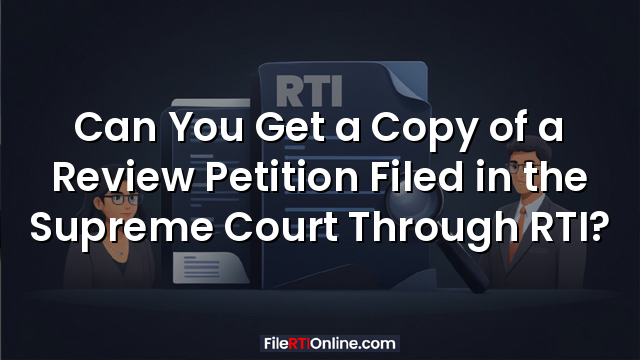One of the most frequently asked RTI questions is:
“Can I get a copy of a review petition filed in the Supreme Court through an RTI application to a public authority?”
Many applicants assume that if an organisation like LIC, a government department, or a PSU files a review petition in the Supreme Court, they can obtain a copy from that department under the RTI Act.
However, a notable decision of the Central Information Commission (CIC) clarifies what can—and cannot—be accessed under RTI in such situations.
Background of the Case
The appellant filed an RTI application to the Life Insurance Corporation of India (LIC) seeking:
- A copy of the review petition filed
- Before the Supreme Court of India
- In connection with a Civil Appeal
The Public Information Officer (PIO) refused to provide the document, citing:
Section 8(1)(d) – Commercial Confidence / Third-Party Exemption
The PIO claimed that:
- Disclosure of the review petition would harm LIC’s competitive position in the ongoing litigation.
- Therefore, it is exempt under Section 8(1)(d) of the RTI Act.
The appellant then approached the CIC.
CIC’s Key Findings: Review Petitions Filed in the Supreme Court Are Not “Held”
The CIC made an important legal observation:
1. Once a review petition is filed in the Supreme Court, the document becomes the property of the Supreme Court
Although LIC prepared the petition and filed it, once submitted:
- The petition is maintained Supreme Court registry.
- LIC no longer “holds” the official copy for the purpose of RTI disclosure.
Therefore, the information belongs to the Supreme Court, not to LIC.
2. RTI Act does not apply to the Supreme Court in the same way
The Supreme Court has its own procedural rules for accessing case records.
These rules override the RTI route regarding court documents.
3. LIC cannot disclose documents held Supreme Court
Under Section 2(f) of the RTI Act, a public authority can provide only:
- Information held , or
- Information under its control
Since the review petition is now under the custody of the Supreme Court, LIC cannot provide it even if it wants to.
CIC’s Final Decision
The CIC held:
- The PIO’s reasoning under Section 8(1)(d) was not the main point.
- The real issue is that LIC does not hold the review petition once it is filed in the Supreme Court.
- Therefore, LIC cannot provide this document under the RTI Act.
CIC’s Advice to the Appellant
The appellant should:
👉 Apply directly to the Supreme Court of India
👉 Using the Supreme Court Rules, not the RTI Act
👉 To obtain certified or inspected copies of the review petition
The Supreme Court has a clear procedure for:
- Copying
- Inspection
- Obtaining records
of pending or disposed cases.
What RTI Applicants Should Understand
1. Court documents have special rules
Documents filed before courts—petitions, affidavits, written statements, review petitions—are governed procedural rules of that court, not RTI Act.
2. Public authorities cannot share documents once submitted to the court
Even if they created the document, once filed, it falls under the court’s custody.
3. The correct route is the Supreme Court Registry
Applicants must file a request under:
- Order XIII of the Supreme Court Rules, 2013, and
- Pay the prescribed fee
to obtain certified copies.
4. Litigation-related documents are not automatically exempt
The issue here was not “commercial confidence” but custody of information.
Key Takeaway
You cannot obtain a copy of a review petition filed in the Supreme Court from LIC or any other public authority via RTI.
Once filed, the document is under the custody of the Supreme Court of India, and the only lawful way to access it is directly to the Supreme Court Registry as per its established rules.
Conclusion
This CIC case clarifies a common misconception among RTI applicants. Although the RTI Act provides extensive transparency, it cannot override the judicial process and court-controlled documents. Anyone seeking a copy of a review petition or similar filing must approach the Supreme Court, not the public authority that filed it.


